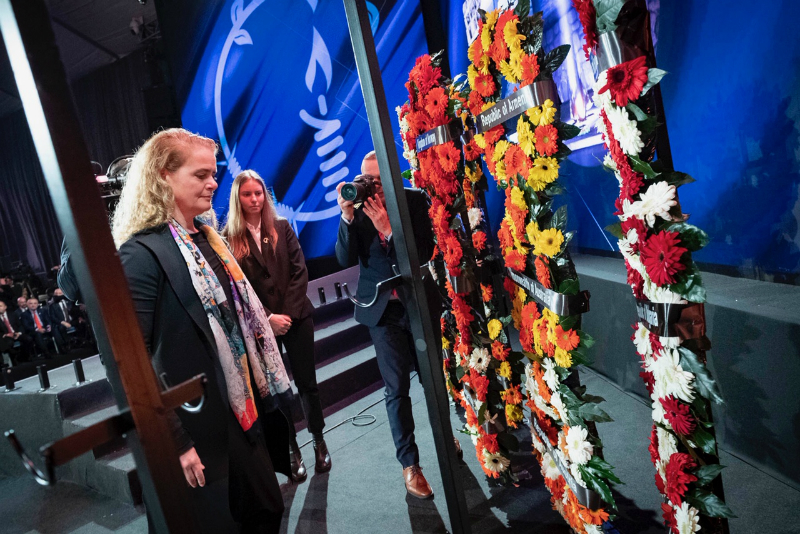Canada’s governor general, Julie Payette, engineer, scientist, and former chief astronaut of the Canadian Space Agency sat down with The CJN during her visit to Jerusalem for the Fifth Annual World Holocaust Forum at Yad Vashem at the end of January. Following her visit to Israel, she traveled to Auschwitz for the 75th anniversary of its liberation.
Why is it important for world leaders to visit places like Yad Vashem and Auschwitz?
It is very important to keep both a physical, and what I would call an emotional, memory of horrible tragedies that have happened. Part of my role is to be there for those commemorations. In terms of the Holocaust, it is absolutely essential that we continue to perpetuate the souvenir [memory] of what happened there. That we continue to do research and that we are putting memorials everywhere so that we teach the next generation. We’re at a special point now where the survivors are in dwindling numbers. Eventually there will be no more eyewitnesses of this horrible tragedy. That’s why it’s important – for education purposes and for the absolute importance that this will never happen again.
A recent poll showed that over 50 per cent of millennial Canadians can’t name a single concentration camp. How can we improve Holocaust education in Canada?
By teaching it in history courses. I am a strong supporter of teaching history at all levels in Canada because it’s normal, memory fades. And when time passes, it is also normal that some events are simplified. And we can’t simplify something like that, because it brought out probably the worst sides of humanity. And we don’t want this to be replicated, ever. Unfortunately, human beings are human beings. Atrocities are committed at times and we need to stand up. We need to all be concerned about these things, and all say no. But we need to know about it.
How would you say the lessons of the Holocaust are influencing Canadian policy today?
We are actually very engaged in policies that will diminish racism, xenophobia and anti-Semitism. Last year we adopted an anti-racism strategy with a specific definition of anti-Semitism, because it’s hard to counteract something without understanding what it is and being in agreement about what it is. The International Holocaust Remembrance Alliance (IHRA) definition of anti-Semitism [which Canada officially adopted last summer] – really gets to the point, and everybody understands what this is about and why we need to stand up.
What most Canadians know about Jews is the Holocaust, period. How can we do better at teaching Judaism as a living culture to promote understanding?
I can’t talk about all of the ways that things are taught, but I can talk about that in particular because I have a 16-year-old son and he’s just finishing high school this year. So there is this course, because school now is non-denominational in Quebec, where they talk about all the great religions and spiritual movements. And I remember two years ago actually sitting at the dinner table and discussing that with him. Clearly, if he brought it up at the dinner table, it’s because it was taught in a manner where he had to ask himself questions.
I remember, particularly, where he looked at me and he said, “Well, they pretty much have similar values,” and I said, “Yes, yes, they pretty much do.” In Canada, I think we exemplify that because we’re an open society, as inclusive as possible. There’s always room for improvement, like my mom would say. But as he said, “The values of, ‘Hey, I don’t want to harm someone, I want to help, I want to live in peace.’” That was pretty cool from a 14-year-old at the time.
What did you discuss during your meeting with President Reuven Rivlin in Jerusalem?
Well, this is not my first time meeting the president. He came on a visit to Canada in April [2019] but he had to leave early [due to the health of his wife who passed away shortly after]. I must say, that was really poignant. Everybody offered condolences, because he is working really hard. And he is still grieving. So I thought he was extraordinary. And we talked about that really, really strong relation between Canada and Israel. That extends not only to trade and culture, but also just in deep-rooted values.
Your predecessor, governor general David Johnston aimed to make the role a more dynamic position. Are you also committed to traveling a lot?
I travel a lot for Canada outside of Canada, but I also travel a lot inside Canada. Because I’m an astronaut, I use a Star Trek line – “We boldly go where no governor general has had a chance to go before.” So we actually visit places that are not necessarily remote, but places where the governor general hasn’t been. We’ve just completed a fantastic trip in northern Manitoba. You know, Toronto, Montreal, Vancouver have other towns nearby and often these towns are not visited, so we go to these places.
And you’ve also started conducting virtual visits to schools?
We call it “GG Interactive.” The school is on one side and I’m in Ottawa in front of a computer and I answer their questions. And all questions are allowed.
This has been a whirlwind trip. Were you able to travel around at all?
This morning we squeezed in the Old City of Jerusalem and Western Wall and it was fascinating.
This interview has been edited and condensed for style and clarity
